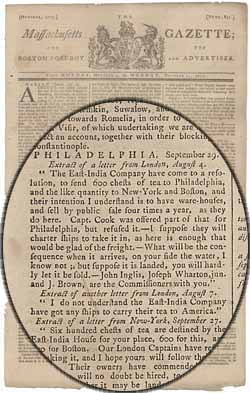"Philadelphia, September 29. Extract of a letter from London, August 4 ..."
To order an image, navigate to the full
display and click "request this image"
on the blue toolbar.
-
Choose an alternate description of this item written for these projects:
- Main description
[ This description is from the project: Coming of the American Revolution ]
This excerpted article from the Massachusetts Gazette; and the Boston Post-Boy and Advertiser, August 1773, quotes several letters discussing the newly enacted Tea Act and its impact upon the duties paid by the East India Company, as well as its implications for colonists.
The Tea Is Coming
The Townshend duty on tea, which had not been revoked in 1770 as had that on other commodities, continues to irk the colonists. Their love for the beverage, though, is largely satisfied. In America and elsewhere, by means both legal and illegal, the Dutch are undercutting their competitors; by the spring of 1773, England's East India Company has amassed 17 million pounds of tea. Eager to prop up the debt-ridden company, Parliament passes the Tea Act on 10 May. The company, freed of its obligations to pay customs duties, will export a portion of its surplus commodity to New York, Philadelphia, Charleston, and Boston, where it will be sold through designated agents. Colonial consumers, the bill's authors reason, will be pleased to have their tea at bargain prices. They will barely notice that the Townshend duty remains in force. News of the act breaks in colonial newspapers in the fall of 1773.
To examine all four pages of this newspaper, please see the online display of The Massachusetts Gazette; and the Boston Post-Boy and Advertiser, 4 - 11 October 1773.
Questions to Consider
1. Why do you think that captains are refusing to transport the tea?
2. What is the New York writer's opinion of the Tea Act? Support your conclusions with evidence from the document.
Further Exploration
3. Who is identified as the mastermind of the plan to export the tea to America? Research the biography of this individual and write a paragraph about him.

